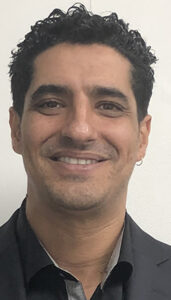By Shahar Masori

SAN DIEGO — Let me take you back to my childhood in Israel. Picture this: a small living room filled with the hum of the one TV channel we had back then. It was 9 PM, and like clockwork, my father was glued to the screen, watching the nightly news. This wasn’t just a broadcast; it was a ritual, a part of the daily routine.
Every hour on the hour, the radio would break into programming with news highlights and the latest security updates. Growing up, I didn’t fully grasp how intense this constant stream of information was, but it was all around me, seeping into my consciousness.
Israeli journalism, much like the country itself, doesn’t pull any punches. The news is often bold, raw, and unfiltered, reflecting a culture that thrives on open debate and isn’t afraid to tackle the tough stuff head-on. This kind of reporting can be both a blessing and a curse. It encourages a public that’s well-informed and unafraid to question authority. But it also means that the news can sometimes feel like a relentless assault, especially when stories are presented in the most dramatic light possible.
I vividly remember the early ’90s, during the Gulf War, when Saddam Hussein was launching missiles at Israel. Our family evenings were spent huddled together in front of the TV, waiting for the next siren to blare, ready to dash into our “sealed room” to protect ourselves from potential chemical attacks. The news anchors didn’t just deliver information; they were almost like emergency responders, guiding us through each crisis with a blend of hard facts and impassioned commentary. I still hear those reports in my head: “A building was almost destroyed in a direct hit; no casualties have been reported.” Even now, those words send a shiver down my spine.
Back then, the news in Israel was dominated by a handful of personalities who became household names. These were not just journalists but figures of authority, often blurring the lines between reporting, politics, and activism. Some of them, like Merav Michaeli, even transitioned from being TV hosts to taking on political roles, moving seamlessly from the newsrooms to the Knesset.
Fast forward to my life in the United States, and the media landscape couldn’t be more different. Here, it’s vast and varied, encompassing everything from major networks and newspapers to niche blogs and countless podcasts; it’s like having buffet of information at your fingertips. With so many voices fighting for attention, there’s a race to stand out, often at the expense of nuance, depth, and sometimes even truth.
In America, I noticed that the news is often packaged to be satisfactory and entertaining. Headlines are crafted to grab your attention, and stories are framed around conflict or controversy to maximize clicks and viewership. While this can make the news more engaging, it also has the potential to distort our perception by emphasizing sensational elements over substantive reporting.
Then there’s social media, the wild card in this whole media game. Platforms like Twitter, Facebook, and Instagram have turned everyone into a potential news source, allowing anyone with a smartphone to broadcast their version of events to the world. This democratization of information has its perks, giving voice to those who might not have had one before. But it also means that misinformation can spread like wildfire, turning social media into a battleground of competing narratives. In Israel, social media has become a hotbed of political discourse, where fake news and misinformation can easily take root. The same is true in the U.S., where echo chambers and filter bubbles often reinforce our existing biases and deepen divides.
So here we are, living in a world where the media wields immense power over how we see and understand our surroundings. It can illuminate critical issues, hold the powerful to account, and foster important dialogues. But it can also misinform, polarize, and manipulate.
As consumers of news, we have a responsibility to be critical, discerning, and ever-curious. We need to seek out diverse sources, question what we read and hear, and be aware of our own biases. In this age of information overload, the real challenge is figuring out how to separate fact from fiction, news from propaganda.
In both Israel and the United States, the media landscape is constantly evolving, shaped by technological advances and shifting societal norms. As we navigate this ever-changing environment, let’s strive to be informed, thoughtful, and engaged citizens, conscious of the media’s influence and our role in shaping public opinion.
*
Shahar Masori was raised in Hadera, Israel, and immigrated to San Diego in 2000, where he helped build a balloon decor business and raised two sons.